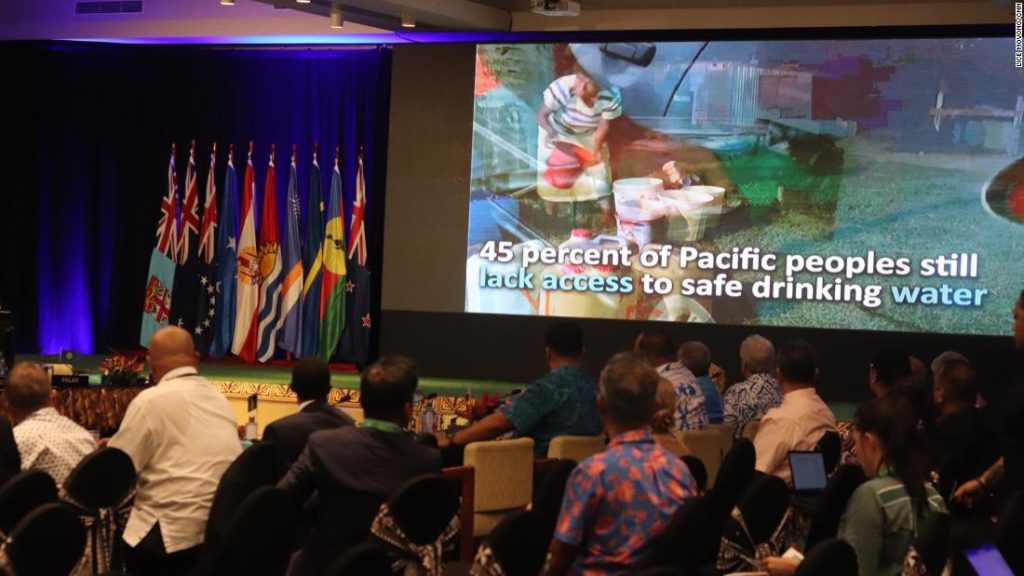Analysis: The US steps up its game as China circles the Pacific

President Taneti Maamau not only opted out of the Pacific Island Forum meeting in Suva, Fiji, but withdrew the country from the 18-member group as a matter of principle over a dispute involving its leadership.Some saw Beijing’s hand in Maamau’s decision to leave the alliance, a claim China’s Foreign Ministry rejected as “completely groundless” during a regular news briefing Monday.But on Tuesday, it was the United States’ turn to step forward with incentives for Pacific Island leaders to counter Beijing’s efforts to dominate an increasingly competitive geopolitical tussle in a region of great strategic importance.A senior administration official told reporters in a call the US was “significantly stepping up (its) game in the Pacific Islands.”The incentives included more funding for fisheries, extra aid, and offers of new US embassies in the Pacific — including one in Kiribati, which along with the Solomon Islands appears to be moving closer to China. The measures will be personally presented to Pacific leaders Wednesday in a virtual address by US Vice President Kamala Harris — underscoring Washington’s efforts to stress the Pacific’s importance to US strategy.An island nation with vast fishing resources Kiribati is a group of 33 atolls scattered over a large area of the central Pacific, covering 3.5 million square kilometers (1.3 million square miles) of ocean — an area larger than India. Around 100,000 people live there under pro-Beijing President Maamau, who was re-elected for a second term in 2020.Three years ago, when the Pacific Island Forum last met in Tuvalu in August 2019, Kiribati was aligned with Taiwan, the democratic island that China’s Communist Party regards as its sovereign territory, despite having never ruled it. But within weeks of the forum, Kiribati followed the Solomon Islands in”The treaty says that facilities on the 14 islands where the US formerly claimed sovereignty could not be used for military purposes without the agreement of the US,” Brady said. But she added there are ways around that. “A dual use facility, where the military functions are not immediately activated, could get around that provision.””China is looking for a location for military facilities in the Pacific,” she said. “As elsewhere in the Indo-Pacific, the way they have been going about this is via dual use port and air facilities.”Last year Kiribati said China planned to upgrade the airstrip to better connect the islands and improve tourism — a key part of its KV20 blueprint — according to Reuters.In May, the Guardian quoted Teburoro Tito, Kiribati’s ambassador to the US and the United Nations, as saying that China had agreed in principle to finance the runway’s upgrade, after the US said financing could take years. “The US turned us down,” Tito said, according to the article.CNN reached out to the US State Department to confirm the claim but didn’t receive a response.China’s Ministry of Foreign Affairs told CNN Tuesday that China is “exploring the possibility of upgrading Kanton Airport with Kiribati” at the request of the Kiribati government to aid travel within the island country.The spokesperson added that China engages in “mutually beneficial cooperation” with Pacific Island nations “based on the concept of community of common destiny, truthfulness and goodwill.””China provides assistance to the extent of its ability without any political string attached,” the spokesperson said. “The goal is to develop economy and improve democracy.”Pacific leaders have a busy agenda over the next two days as they consider the US’s renewed vigor in the region — and any rival offers from Beijing. “It is immediately obvious that geopolitics have intruded on the forum’s agenda and will be a great distraction,” said Patricia O’Brien, a visiting fellow in Pacific Affairs at Australian National University, before the US released its plan.Among leaders’ other priorities will be to continue efforts to bring Kiribati back into the “Pacific family.” Though it remains to be seen if President Maamau sees a brighter future alone — backed by China — and if other Pacific nations will join him.







